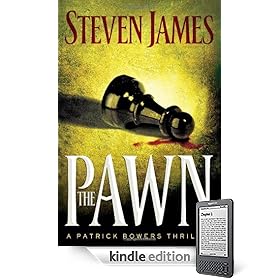 At some point, the first of the Patrick Bowers books by Steven James, The Pawn, was available for free for the Kindle, and I grabbed a copy. On the flight out to San Diego, when I finished the other books I was reading, I started it, and just finished it recently. It's a modern crime novel, featuring an FBI agent who is tracking a serial killer, so you've got a good idea what kind of book it is.
At some point, the first of the Patrick Bowers books by Steven James, The Pawn, was available for free for the Kindle, and I grabbed a copy. On the flight out to San Diego, when I finished the other books I was reading, I started it, and just finished it recently. It's a modern crime novel, featuring an FBI agent who is tracking a serial killer, so you've got a good idea what kind of book it is.On the positive side, it was engaging, particularly in the middle. It had a slightly slow start with some fairly clunky exposition -- particularly odd since, for a first book in a series, it starts as if you already know everyone. And the climax is so frenetic and so desperate to be exciting that it just comes off corny, plus you can't quite picture what's going on in some of it unless you are willing to work a lot harder than I was at it. But the story was gripping and fairly suspenseful.
On the negative side, a lot of it was very obvious and very clumsy. There was an abortive romance subplot that was about as subtle as something written by a fourteen-year-old. The storyline featuring the relationship the main character has with his daughter rotates between being trite, and being mildly interesting, and then rolling right back into trite. Generally, everything other than the main storyline is weak.
The main storyline, however, does manage to find a few new turns to put onto the track-a-serial-killer genre.
First, our main character not only isn't a profiler, he's not terribly keen on profiling, and instead focuses on geographic patterns. It's a pity we get so little about how that works -- the author doesn't want to bore the audience so all we get is a few metaphors that are less explanatory than those on Numb3rs, and a lot of prose about Bowers at work that doesn't explain the theory at all of what he's doing. But there are a few glimpses that suggest there might be something there.
Second, there's some interesting ties into a historical event that we all know, and which I won't name because that would be a spoiler. The book sheds a lot of light on an event we all think we know but don't really know that well at all, but it does so in the tricky way of fictionalizing a bit here and there, leaving the reader to wonder if the rest of it is fictionalized -- or the credulous one to believing all of it. It's a technique Michael Crichton liked to abuse, but here, it's not that hard to go find out how much of what's in the book is actual history, and how much is fictionalized. I wonder how many people will do that. In any case, the inclusion of that element provides an unusual twist in a serial-killer story in that it gives more background on the actions and lends them more significance on the global stage.
The imagery in the book never hesitates to approach the disturbing and then roll around in it for a while. There are some particularly gruesome flashbacks. I don't just mean visceral and gory, though there is that, but also depicting horrifying scenarios in uncompromising, and perhaps exploitative, language. The real question is to what extent they are gratuitous. They certainly explain some of the characters; but less agonizing detail might have done that anyway, but might it not also have blunted the impact? I could argue either way. I will say, though, that at times I felt uncomfortable enough to want to skim ahead, which I usually only do when I'm bored by a book. There are some people I know who I would not recommend read this book.
In all, there was an interesting and suspenseful story held back by some amateurish writing, a few clumsy side-plots (if they'd been omitted the story would have seemed too linear, but that doesn't excuse their weakness), and an unsatisfying ending that tried too hard to look like an action movie in ways that don't translate well into a novel. If I had the second book for free, I'd read it, but it would be on probation. I don't think I'll pay for it, though.

 RealTime and RTC
RealTime and RTC Prism
Prism Uncreated
Uncreated Bloodweavers
Bloodweavers Foulspawner's Legacy
Foulspawner's Legacy Lusternia
Lusternia
No comments:
Post a Comment